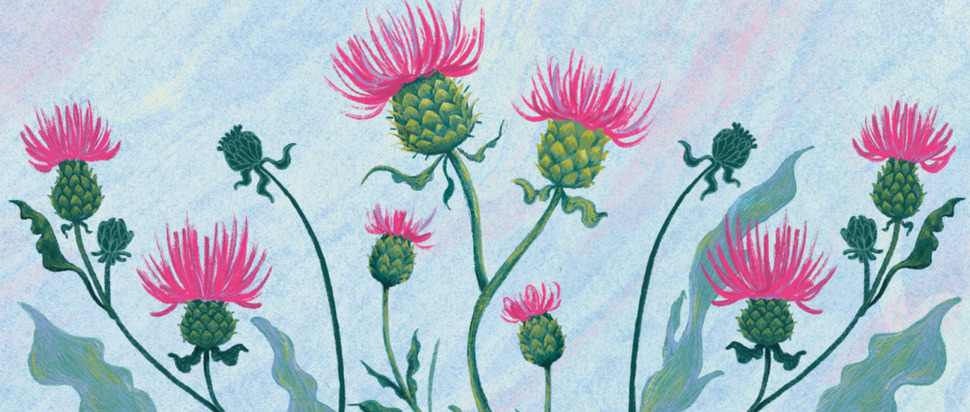Adolescence and the Scottish independence movement
Coming-of-age is tough – for a person and a nation. One writer reflects on maturing alongside the Scottish independence movement, navigating an adolescent selfhood, and the growing support for an open, progressive nation
I was 16 when I first fell in love with the idea of an independent Scotland, and like most first loves it didn’t work out. So when plans of a second referendum were announced for almost a decade later, it felt like running into an old flame. So much had changed but there was still some part of me that felt the same way I had all those years ago – a tangible sense of national pride that felt innate and genuine.
It’s not exactly normal to romanticise a political issue like this, but it’s hard not to when it has bookended my entire adolescence. Voting in the first referendum was a defining point of my teens, and I had just turned 25 in 2022, when the Supreme Court rejected the bid for IndyRef 2. It was a decision that simultaneously defeated and bolstered the resolve of supporters like myself, because it was arguably more evidence of the paradoxical power asymmetry within the constitutional makeup of the UK.
Back in 2014, my generation became the youngest in British history to vote in an election. It felt like destiny: at a time when so many of us were being asked to make decisions about our own future, we would also be deciding the future of the country. I didn’t pretend to understand the various intricacies of the debate but, what I did understand as a 16-year old, was that someone telling me not to do something meant I only wanted to do it more.
The arguments of the ‘Better Together’ campaign were coded in the language of a jaded parent – Scotland isn't big enough, our wants are unrealistic, we have to avoid risk. To me, then, the referendum wasn’t about achieving some arbitrary political goals, but affirming feelings I had harboured all my life as a Scottish person in the UK: sidelined, never listened to, longing to have control over our own future. It’s embarrassing to look back now and realise how indistinguishable my politics were from my angst.
A pivotal moment in anyone’s coming-of-age is reckoning with the creeping sense of your own naïvety and realising that maybe some of the things your parents said were actually right. Over the years, the Scottish independence has, at times, witnessed a similar reckoning within the movement.
In order to distance ourselves from the likes of Brexit supporters, we paint the cause of Scottish Independence as one with more noble intentions: dismantling the systemic oppression of Westminster and enacting a progressive framework in its place. However, that relies on the exceptionalist idea that Scottish people are inherently more left-wing than the rest of the UK – which is only somewhat true if your sole point of comparison is a Tory government. Just this year, a True North poll found that most Scots are in favour of new oil licenses, Scottish Police has admitted it is institutionally racist and, as noted by GMB Scotland, workers across public services continue to be offered less pay than their counterparts in England. Gaining radical power wouldn't automatically see us use it radically.
The primary motivation for an independent Scotland is often tied to a specific narrative: this is a reclamation of our sovereignty after centuries of oppression by an unfeeling English state. There are elements of truth to that story, but it’s dangerous to view Scottish independence as an act of decolonisation when it is also a direct product of it – industrial decline in Scotland came partly as a result of the fading influence of the British Empire, and it is no coincidence that Scottish nationalism grew in tandem with that decline. The UK began the process of dismantling its colonial industrial complex throughout the 1960s; simultaneously, as the Scotsman reports, the SNP saw its membership grow from 2,000 to 70,000.
Like anyone struggling with their sense of self, our rabid performance of a distinctly 'Scottish' identity – saltires and painted faces – has been compensation for our insecurities; deeper, messier questions are drowned out by the sounds of bagpipes and freedom cries. The Britishness we so desperately want to separate ourselves from is, now and forever, an inextricable part of who we are.
Having your entire sense of self crumble is part and parcel of any good quarter life crisis, and as much as it’s frightening, it can be equally liberating. One thing I’ve learned from this period of my life is that once you stop chasing an idealised version of yourself, you can start finding out who you really are. You can start to meaningfully express a sense of self in a more open, empathetic way.
A vital step in the future of the independence movement is re-defining our concept of what 'Scottishness' means. It doesn't have to be rooted in arbitrary cultural sensibilities or a vague sense of historical victimisation, but rather in beliefs and values that are universal. I’ve often hoped that one day 'Scottishness' can come to mean openness – that the day we decide to establish a border is the day we allow anyone to pass through it; that we fight for environmental policies which give not just us, but everyone, a chance at a future. This is a dream I’m happy to keep holding on to – for IndyRef2, and ever after.
